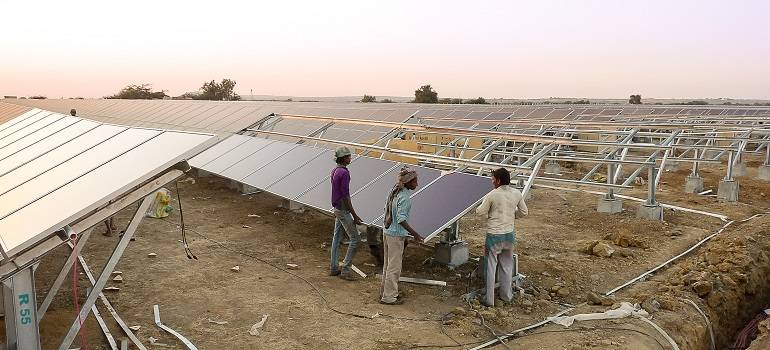
Music to the ears of solar power producers setting up their projects using Chinese equipment, government proposes to exempt those having power purchase agreements (PPAs) with procuring states from the steeper customs duty levy.
Sources in the power ministry said that all solar power projects having valid PPAs as on August 1, 2020 will escape the proposed import duty on solar equipment and components even if such imports are to be done from China. This would be an one time exemption as the government under its Atmanirbhar Bharat mission wants to restrict imports of all equipment for which domestic manufacturing is existing.
Power ministry has proposed a 20-25 per cent basic customs duty on solar module imports for the current year that will go up to 40 per cent level in the next year. Also, the duty on solar cells has been proposed at 15 per cent level for the first year and a higher 30-40 per cent level in the next year. The levy has been proposed to become effective from August 1, when the existing 15 per cent safeguard duty on solar component imports expires.
“This is good development as it would prevent delays in execution of solar power projects and also allow the quoted tariff to remain unchanged. A ny change in import of equipment would not only result in delays but also in crease the cost of projects,” said an official of leading solar powe r producer asking not to be named.
“The imposition of the customs duty may not serve the desired purpos e since it increases the electricity cost for the consumers in a sector where distribution companies are already reeling under huge losses,” added Sanjeev Aggarwal, founder and chief executive officer, Amplus Energy Solutions, one of India’s largest solar rooftop firms.
The power ministry’s proposal on giving exemption to projects with PPAs would need to be ratified by the finance ministry. Sources said that Power Minister R. K.Singh has assured the industry that even if duty exemption was not available, the Ministry of New and Renewable Energy Sources would allow developers to claim reimbursements for duties paid.
On Friday, Singh informed reporters that he has told states restrict imports in critical energy sector projects where domestic capacities existed. In the renewables space, imports stood at $ 2.9 billion in FY19 and about 70 per cent of this was from China.
The proposal on customs duty on solar imports is part of a larger measure being looked at by the government through imposition tariff and non-tarrif barriers on imports of non-essential items coming from China.
While government has earlier put some restrictions on investment from neighbouring countries including China, the added dimension of confrontation between the armies of the two countries have fast tracked the proposals.
Checks on solar equipment is being considered as Chinese firms supply about 80 per cent of solar cells and modules to India. India imported solar equipment worth $2,817.34 million, $3,418.96 million, and $1,694.04 million, in FY1 7, FY18, and FY19 respectively from China. In the first nine months of FY20, imports from China stood at $1,179.89 million. The imports has fallen drastically since April due to COVID 19 outbreak and shutdown of operations in China.
The proposal on BCD is being considered to prevent unrestricted imports of solar gear from China once safeguard duty goes. With higher actual duty of over 28 per cent, developers would be incentives we’d to procure gear from the local market where manufacturing of renewable equipment is kicking up.
According to renewable energy consulting and communication firm Mercom, if the proposal BCD is implemented it could result in return to the earlier scenario when solar tariff under bids started going higher on higher safeguard duty. And when government put a tariff cap, bids started shrinking leading to cancellations of a few auctions.
Source: IANS

